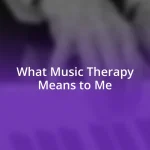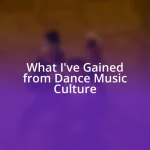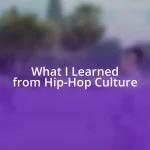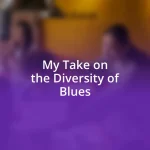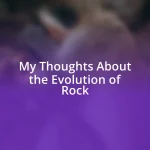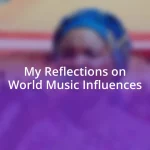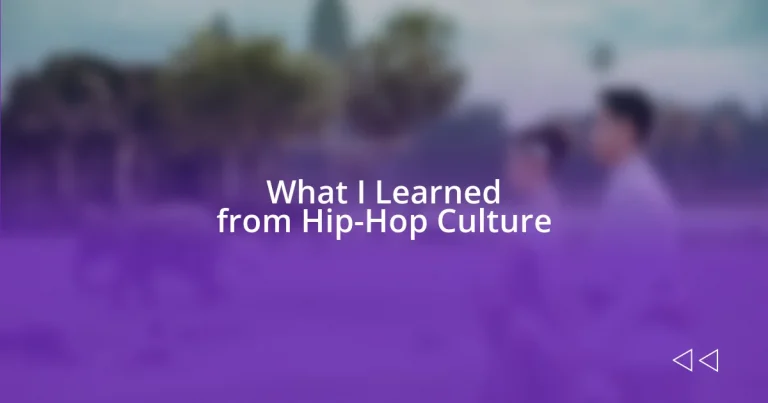Key takeaways:
- Hip-hop serves as a powerful voice for marginalized communities, fostering connection and social justice movements through its expressive lyrics and community gatherings.
- The culture promotes personal growth and creativity, encouraging individuals to embrace authenticity, use music as therapy, and learn from each other’s experiences.
- Understanding hip-hop’s history reveals its roots in the fight for civil rights and justice, highlighting the responsibility of artists to address societal issues through their work.
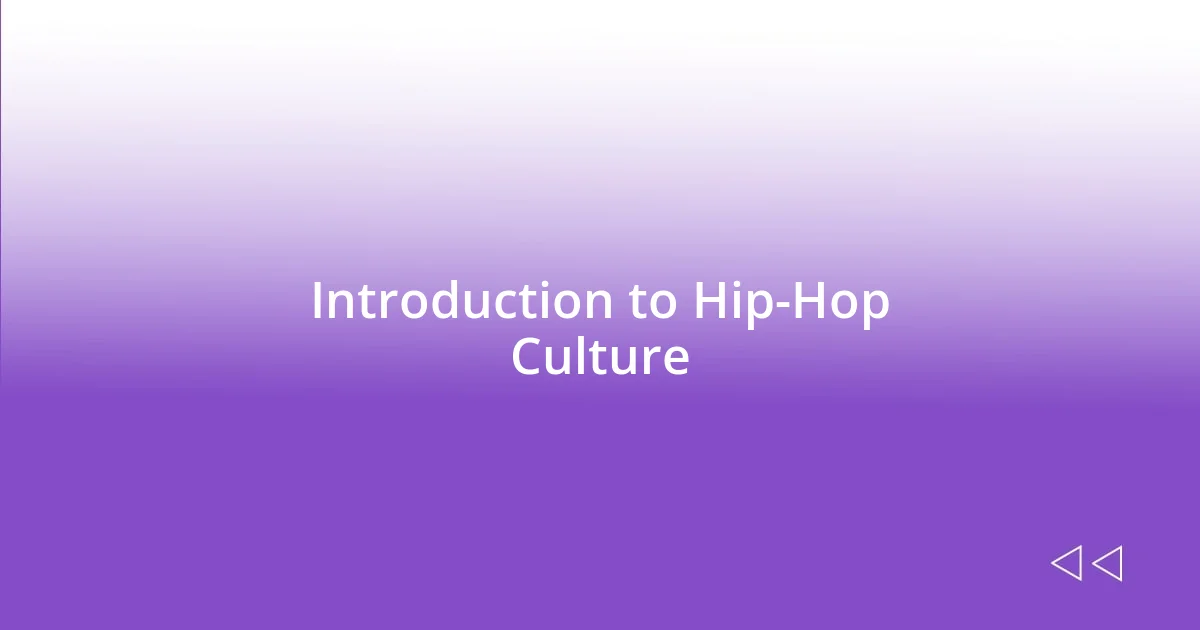
Introduction to Hip-Hop Culture
Hip-hop culture, to me, has always felt like a vibrant tapestry woven from the threads of music, dance, fashion, and art. Growing up in a diverse neighborhood, I remember my heart racing the first time I heard a beat drop. It was more than just sound; it was an invitation to experience a way of life that celebrated creativity and resilience.
What fascinated me most was how hip-hop served as a voice for communities often unheard. I still recall attending an underground rap battle; the energy was electric. The artists poured their hearts out, addressing struggles and triumphs that resonated deeply with everyone present. This connection is a testament to hip-hop’s power to bridge divides and foster a sense of belonging.
Moreover, hip-hop is a living history, continually evolving yet rooted in significant cultural movements. Have you ever thought about how a simple lyric can encapsulate years of social change? For me, each song I listen to forms a narrative that reflects both personal and collective experiences. It’s this marriage of storytelling and rhythm that makes hip-hop a compelling force in our ever-changing world.
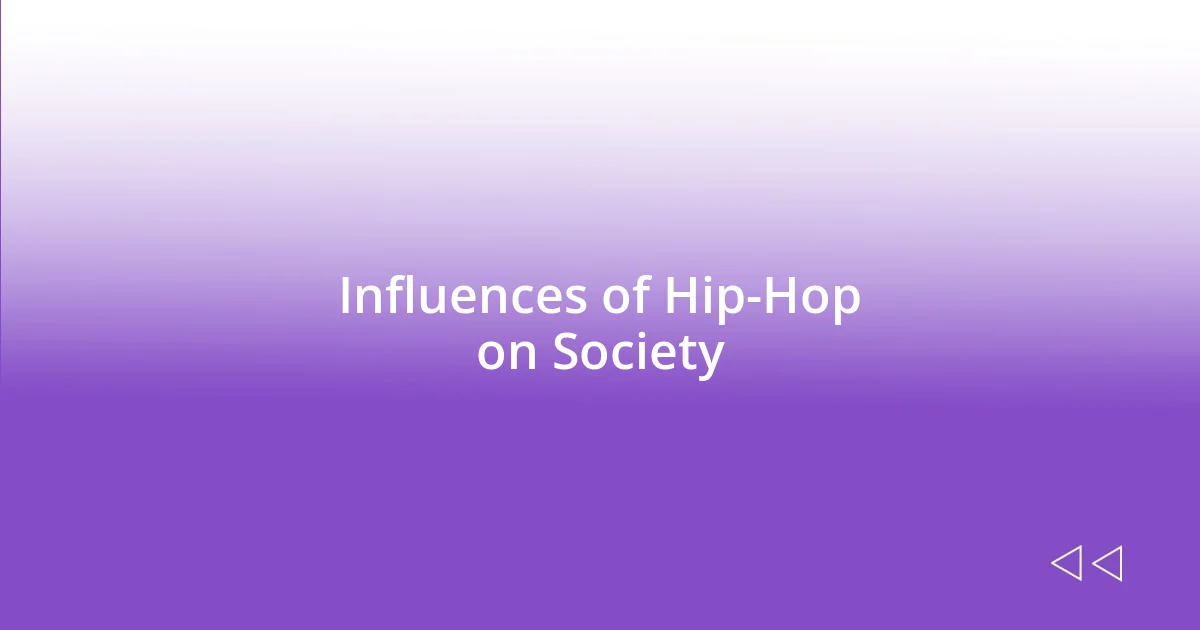
Influences of Hip-Hop on Society
Hip-hop’s influence on society is profound and multifaceted. I remember vividly how, during my teenage years, hip-hop became a source of inspiration and empowerment for young people in my neighborhood. It wasn’t just about the music; it sparked movements that pushed for social justice and spoke out against inequality. The lyrics of artists like Kendrick Lamar and J. Cole often felt like heartfelt conversations on topics like racism and poverty, leaving a lasting impact on listeners, myself included.
One aspect that strikes me is the way hip-hop has shaped fashion and street culture. I think back to my high school days when baggy jeans and oversized shirts became symbols of expression. It was incredible to see how artists influenced trends, and it made me feel part of something larger. This connection to hip-hop allowed me to embrace my individuality while also connecting with my peers in a unique way.
Moreover, hip-hop has transcended music, becoming a global phenomenon that unites diverse cultures. I’ve had conversations with people from different parts of the world, and we often bond over a shared love for iconic tracks or artists. This cultural exchange has opened my eyes to various perspectives, reinforcing the idea that hip-hop has the power to bring people together across societal divides.
| Influence | Description |
|---|---|
| Social Justice | Hip-hop has become a platform for addressing issues like inequality and racism, inspiring movements for change. |
| Fashion & Culture | It has significantly influenced fashion trends, allowing for self-expression and community identity. |
| Global Connection | Hip-hop transcends borders, fostering connections between diverse cultures through shared music and experiences. |
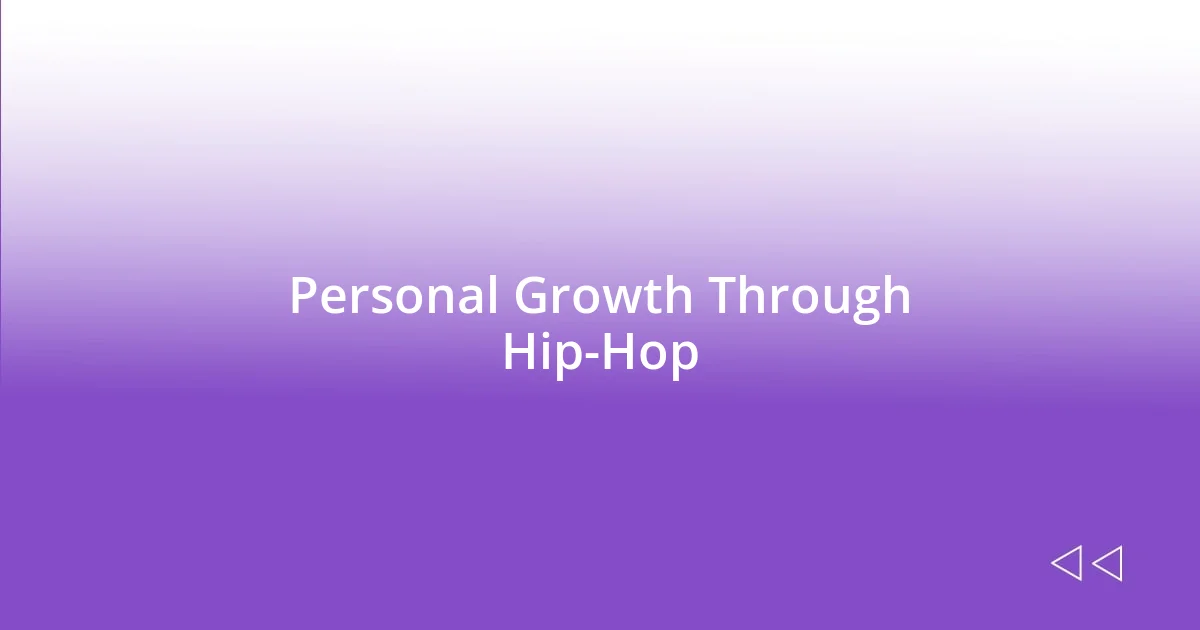
Personal Growth Through Hip-Hop
Hip-hop has been a powerful catalyst for my personal growth in countless ways. One vivid memory is the first time I scribbled my thoughts into a rap. I remember feeling both nervous and exhilarated, pouring my emotions onto the page. It was transformative—what began as just scribbles became a means of self-expression that helped me process my feelings and experiences. Sharing those verses in a small circle of friends boosted my confidence immensely. I realized that articulating my struggles and aspirations through hip-hop was not just liberating; it taught me the importance of vulnerability in personal growth.
- Embracing Authenticity: Hip-hop encourages me to be my true self. The genre’s emphasis on realness prompts us to celebrate who we are, embracing both our strengths and imperfections.
- Creativity as Therapy: I found that writing lyrics often serves as a therapeutic outlet. Expressing my emotions through music can be a healing experience.
- Community and Support: Participating in cyphers, where artists freestyle in a circle, introduced me to a network of like-minded individuals. The encouragement and constructive feedback I received there have been invaluable for my growth as an artist and person.
- Resilience: The narratives in hip-hop, often steeped in hardship and triumph, inspire me to persevere through my challenges. Understanding that success is often born from struggle reshapes my perspective on setbacks.
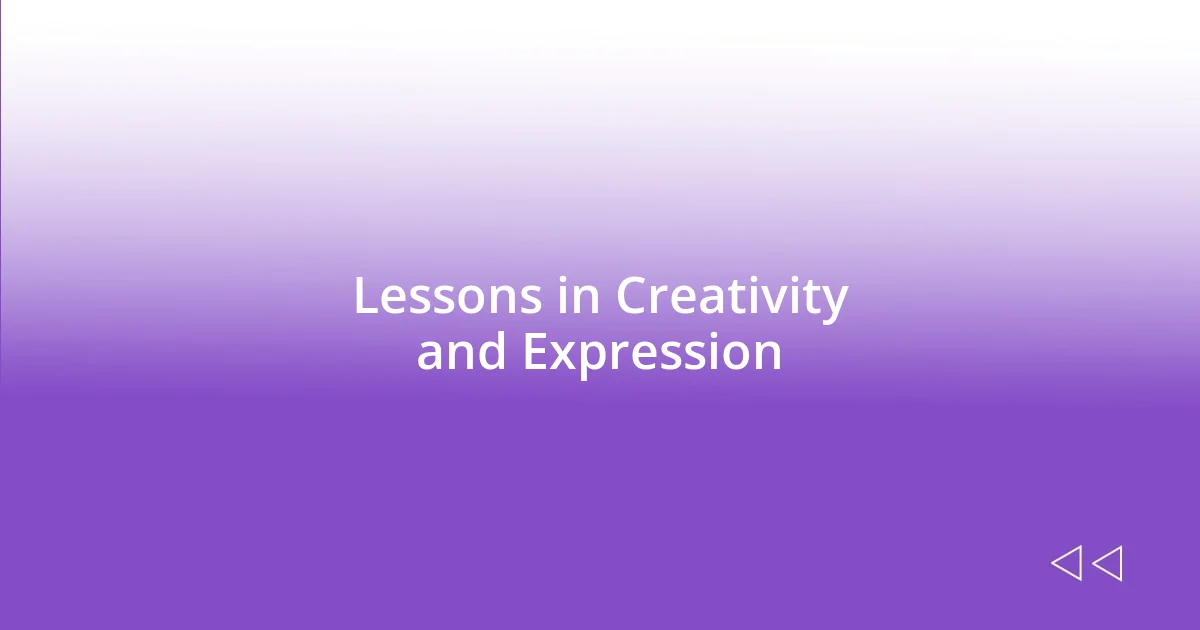
Lessons in Creativity and Expression
One lesson that resonates deeply with me from hip-hop culture is the profound value of self-expression. I remember the first time I listened to an artist pour their heart out about personal struggles; it reminded me of my own challenges. This raw honesty inspired me to reflect on my experiences and express them through my own creative outlets. Isn’t it fascinating how a single song can evoke such powerful emotions and encourage us to be more open?
As I dove deeper into hip-hop, I discovered the endless possibilities for creativity that this culture offers. I think back to the moment I experimented with mixing beats and writing lyrics that didn’t follow traditional formats. It was liberating—like breaking free from a cage. The freedom to bend rules and create something uniquely mine helped me realize that true art often thrives outside the confines of norms. Have you ever felt that exhilarating rush of doing something completely your way?
Additionally, hip-hop embodies the spirit of collaboration and community, fostering a space where collective creativity flourishes. I fondly recall participating in a local event where budding artists came together to showcase their talents. The energy was electric, and the supportive feedback from peers fueled my passion. Sharing ideas and collaborating with others ignited a spark in me that I never knew existed. It’s remarkable how this tight-knit community encourages us to push our creative boundaries while uplifting everyone involved.
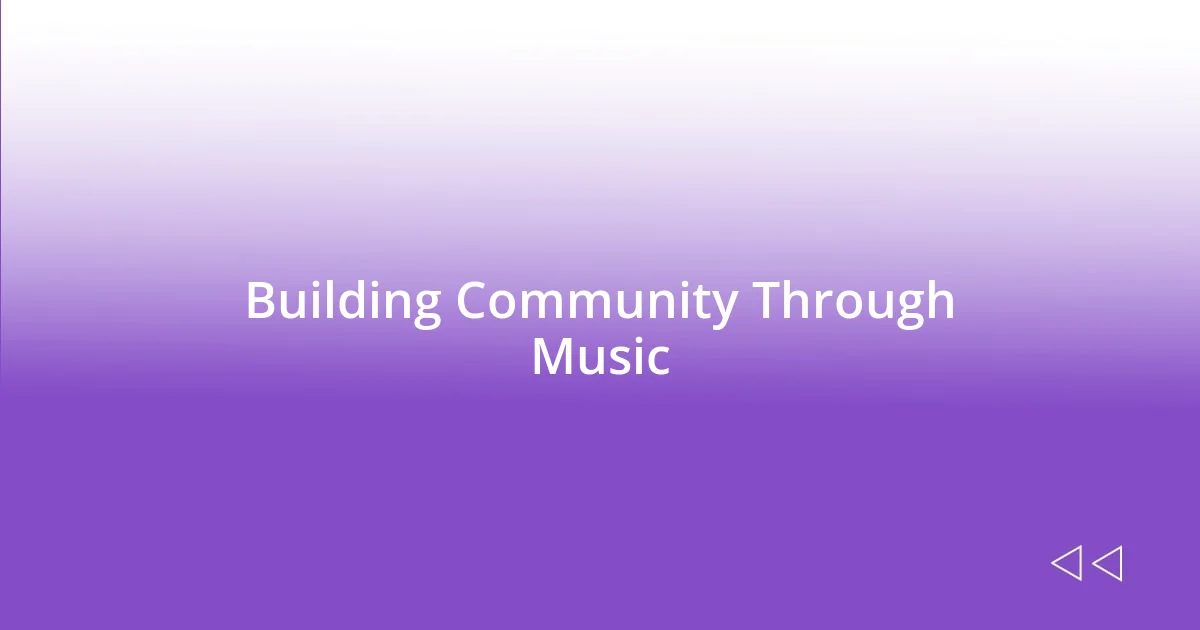
Building Community Through Music
There’s something truly special about how hip-hop brings people together through music. I’ll never forget the first street block party I attended, where artists of all backgrounds shared their flows. The vibe was infectious—strangers turned into friends in an instant, united by a shared love for rhythm and rhyme. Listening to each other’s stories shared through beats created a sense of belonging that I hadn’t felt before. Have you ever felt that kind of connection through music? It’s almost like you can momentarily forget the world, lost in a shared heartbeat.
One of my favorite experiences occurred during an open mic night at a local café. The room was filled with diverse voices, each one adding to the fabric of our community. I remember cheering on an artist whose words struck a chord deep within me. Their verses spoke about struggles I could relate to, emphasizing how we can find common ground through vulnerability. This music didn’t just entertain; it built a bridge of understanding. Isn’t it amazing how a few carefully chosen lines can do that?
It’s also worth noting how music facilitates dialogues around social issues. When I engage in conversations sparked by a thought-provoking track, I find that we often learn from one another’s perspectives. There was a time when I joined a discussion group after listening to a powerful song addressing systemic issues. The lyrics prompted deep conversations and reflections on our own communities. That night, I realized hip-hop is more than entertainment; it serves as a catalyst for awareness and change, creating a path towards collective healing and empowerment.
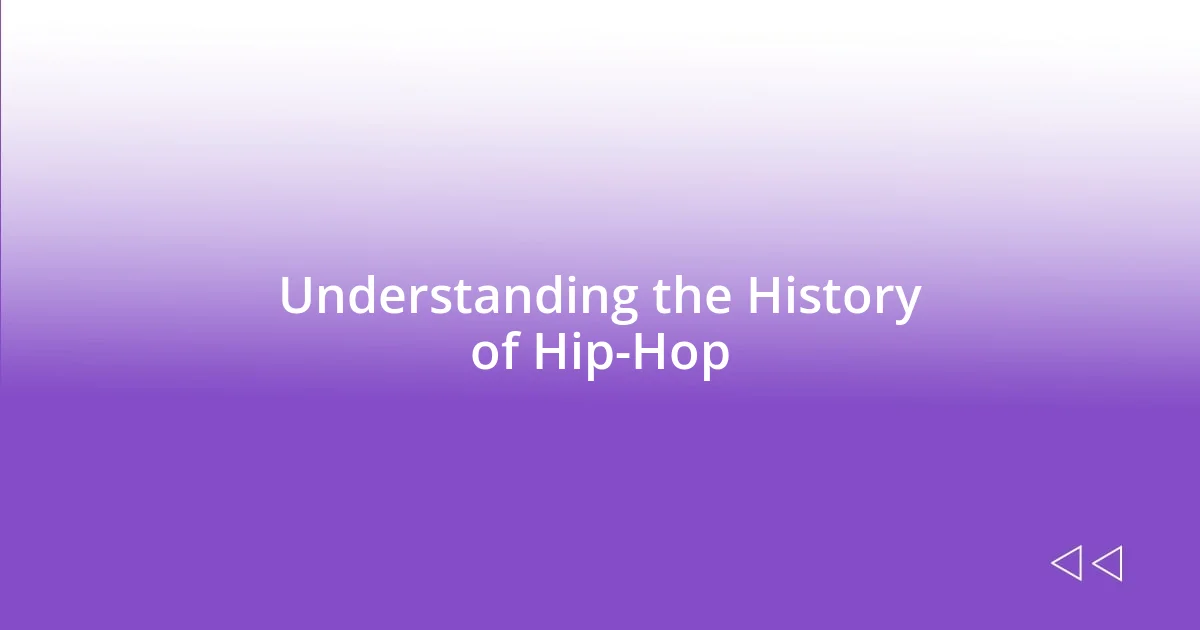
Understanding the History of Hip-Hop
Hip-hop culture emerged in the 1970s in the South Bronx as a powerful voice for marginalized communities. I find it captivating how DJs like Kool Herc and Afrika Bambaataa laid the groundwork for what would become a global phenomenon. When I first learned about block parties and the spontaneous creativity that erupted in those early days, it struck me as a beautiful rebellion. Can you imagine how freeing it must have been for those young people to express their realities in ways that had never been done before?
As I delved into the history, I realized the art forms of graffiti and breakdancing were just as significant as the music itself. Each element told a story, a vivid chronicle of the struggles and triumphs of urban life. I distinctly remember visiting an art gallery showcasing iconic pieces from the ’80s graffiti scene. The colors, the energy—each mural felt like a portion of history transformed into visual poetry. It got me thinking about the role of visuals in hip-hop; how they complement the sound and give voice to the often unspoken narratives within our communities.
Moreover, the evolution of hip-hop reflects broader social and political movements, intertwining with the fight for civil rights and justice. I recall a profound moment watching a documentary that explored how artists like Public Enemy and N.W.A. used their platforms to challenge systemic oppression. It made me think about the responsibility that comes with art. Isn’t it incredible how the narrative of hip-hop grew to encompass a larger discourse on not only personal struggles but societal issues? This rich history not only informs us about the past but inspires movements for change in the present.
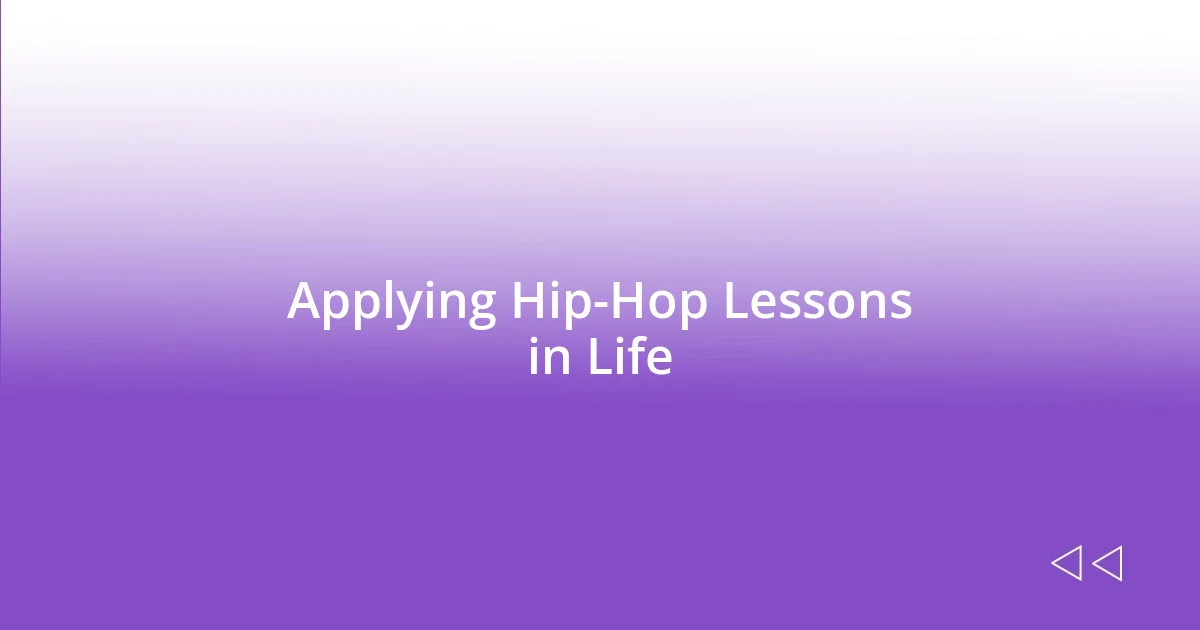
Applying Hip-Hop Lessons in Life
There are valuable life lessons embedded in hip-hop culture that resonate with me deeply. For instance, the emphasis on resilience is something I’ve internalized. I remember the first time I faced rejection while pursuing my passion for writing. Instead of giving up, I channeled those feelings into creating poetry that echoed my experiences. Just like many hip-hop artists, I learned to transform pain into art and use setbacks as stepping stones for growth. Have you ever turned a challenge into fuel for your creativity?
Collaboration is another crucial takeaway from the hip-hop world that I apply in my everyday interactions. When I collaborate with others, whether in art or in problem-solving, I become more open to new ideas. I had this epiphany during a community project where we all contributed our unique talents to create something beautiful. The mix of styles, perspectives, and techniques reminded me that true strength often lies in diversity. Doesn’t it feel empowering to know that together, we can often achieve what we cannot alone?
Moreover, hip-hop’s unapologetic authenticity encourages me to embrace my true self. One of my favorite moments was attending a spoken word event where artists bared their souls, sharing their raw truths. Their bravery ignited something within me, inspiring me to leave behind the fear of judgment and express myself authentically. In a world that often demands conformity, isn’t it liberating to embrace our individuality and speak our truth? That honesty fosters deeper connections and greater understanding in our lives.


